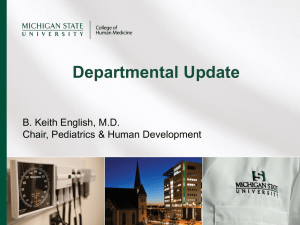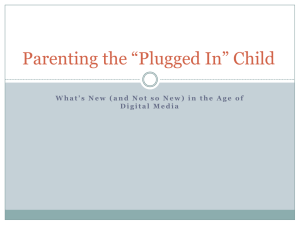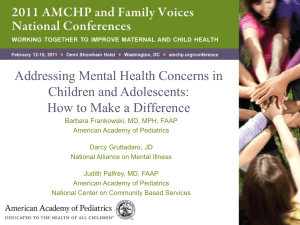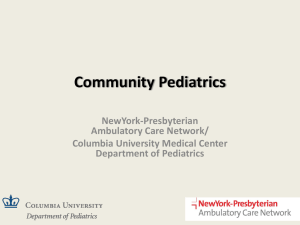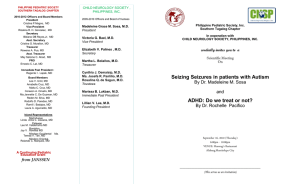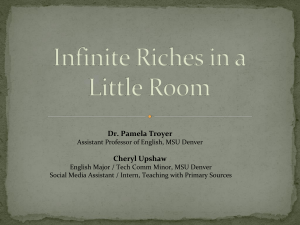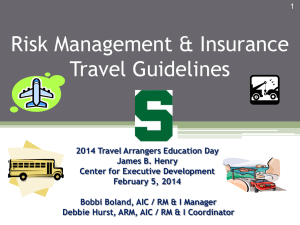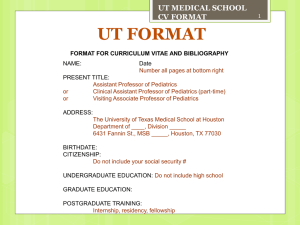here - Department of Pediatrics and Human Development
advertisement
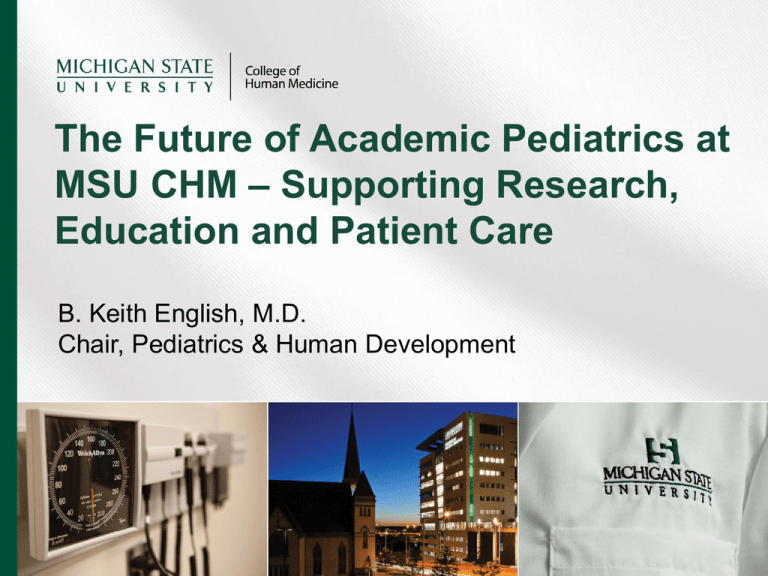
The Future of Academic Pediatrics at MSU CHM – Supporting Research, Education and Patient Care B. Keith English, M.D. Chair, Pediatrics & Human Development MSU CHM Community Campuses and Hospital Partners Upper Peninsula Region Upper Peninsula: Marquette General Hospital Midland Regional: •MidMichigan Health (Midland, Alma, Gladwin, Clare) •Flint: •Genesys Regional Medical Center •Hurley Medical Center •McLaren Regional Medical Center Hospital Partners = Student Clinical Education Sites Grand Rapids : •Spectrum Health •Mercy Health Saint Mary’s Traverse City Midland Region Lansing: •Sparrow Health Grand Rapids Traverse City: Munson Medical Center Flint Lansing Our Challenges • Changing healthcare environment, shift to “value-based care” and shared risk models, clinical performance pressure • Threats to traditional sources of research funding • Need to work with multiple health system partners 3 Our Opportunities • Our goal is to improve the health and wellbeing of children – our mission is worth fighting for! • We must demand excellence in all of our missions – patient care, education, research, and service to our community and region 4 Too much is at stake • The future is bright for academic pediatrics – and for our children • Remarkable developments in genomics and other fields offer the potential for the development of “personalized pediatrics” -individualized approaches to the diagnosis, treatment, and, most importantly, prevention of disease • “Personalized medicine” must start in pediatrics, not in adulthood – and it will fail if not brought to populations of patients Preventive Medicine: Not A New Concept in Pediatrics! • Immunization, accident prevention, obesity prevention, already key areas • Genomics will challenge us by providing a trove of new data that will allow us to broaden the scope of preventive pediatrics considerably Service to the Community and the Region • We must be advocates for children in this region; too many children are at risk for poor health outcomes • Improving the health and wellbeing of children requires structural change, community engagement, and political will – and we must partner with community physicians and community leaders The Future of Pediatric Research? • The future of pediatric research is in team science – at the bench and in translation • Focus of clinical research must switch to long-term outcomes that matter to patients and their families • Will require robust informatics that will allow tracking of outcomes and provide the infrastructure for “personalized pediatrics” • The genomics revolution can help transform individual patient care and improve population health A Shared Vision for Pediatrics • Demanding excellence in all of our missions – service, patient care, education and research • Setting high standards … together • Expanding pediatric research by recruiting clinician-investigators and basic scientists – Pediatric Research at MSU • Translating evidence into practice will require robust information systems and strong partnerships with health system partners and community physicians • Translational research also requires these partnerships and this infrastructure • “Personalized Pediatrics” or “Precision Pediatrics” The future of academic pediatrics at MSU • Academic Pediatrics can and must thrive at MSU CHM – the health and wellbeing of our children is at stake • Must expand our partnerships between pediatric faculty, students and residents in Lansing, Flint, and Grand Rapids • Faculty recruitment AND retention is the key to moving to the “next level” Making the Pie Bigger • To grow, we cannot fight over the pieces of the current pie – we must find ways to enlarge the pie • Collaboration in patient care, education, research and outreach/service is the only way to make the pie bigger and generate the advances that will improve the health of our children Recruiting and Retaining Outstanding Faculty Members • If we build it, will they come? • Need to recruit outstanding faculty members AND “grow our own” Retaining Top Faculty: The Nepenthe Principles • “Modern Faculty Development: A ModernDay Odyssey” – Beckerle, et al, Science Translational Medicine, 3: 1-3, 2011. Nepenthe -- an “antidote to suffering” in the Odyssey The goal is to enhance faculty fulfillment – better quality of live, satisfaction, retention, productivity – by using a carrot instead of a stick Helping Faculty Thrive (Nepenthe Principles) 1. Value the contributions of individuals AND teams; the collaborative model 2. Nurture young faculty – mentoring is critical and the lack of effective faculty development is a powerful predictor of faculty dissatisfaction 3. Integrate the personal and the professional Helping Faculty Thrive (Nepenthe Principles) 4. Create inclusive communities 5. Develop enlightened leaders – who promote fair and equitable treatment of faculty, transparent decision making, use of the Chair role in service to the department, building esprit de corps, fostering faculty career development Faculty Leadership in Pediatrics • Faculty must lead the way if we are to grow academic pediatrics at MSU • Pediatric faculty leaders in Lansing, Grand Rapids and Flint are being asked to tackle the Departmental “Academic Program Review” in 2014-15 --- Renuka Gera leads this effort and will talk about it in a few minutes • Faculty input at last year’s Departmental CrossCampus retreat was very helpful in guiding our next steps The Six Key Questions for the APR 1.What do we do? 2. Why do we do it? 3. How well do we do it and who thinks so? 4. What difference would it make whether we did it or not? 5. Given our present status, how do we intend to change in ways that help us advance? 6. How will we evaluate our future progress and successes? Pediatrics and Human Development APR: Timetable • Self-study to be completed by February 1, 2015 • Report to Dean and then Provost in April, 2015 • Great opportunity for strategic planning for Pediatrics – we want input from ALL faculty Summary of Cross-Campus Retreat Pediatrics and Human Development November 9, 2013 • Presentations from Flint, East Lansing and Grand Rapids on student and resident education • Breakout sessions on : Communication, Engagement with MSU CHM, Mentoring Junior Faculty, and Obstacles and Opportunities in Improving Patient Care, Medical Education, and Pediatric Research Communication - Action Steps • Create an improved, centrally-structured Faculty Directory with responsibility to update it regularly – Must be searchable: Campus; specialty; research/educational/clinical interest keywords • Consolidate Grand Rounds – and maybe other premier teaching opportunities – ?? same date/time AND with appropriate technology in the selected sites • Research – Research Committee with representative from each campus – at least 3 largest • Website upgrade – to allow for coordination through the single departmental focus Engagement – Action Steps • Conduct a faculty inventory – Specialty, interests, expertise • Identify tangible benefits of being affiliated with MSU – Incentivize it; tuition break, parking, MSU email addresses, library access, etc. • Improve the promotion and reappointment processes • Create a single IRB approval process across campus to facilitate easier collaborative experiences • Create a defined mechanism/facilitator/meeting to help manage/network for collaborative research • Offer more social events to facilitate networking Mentoring of Junior Faculty • Some obstacles to Mentoring – Distance/isolation – Who are the mentors? • Peers, senior mentors, etc; need connections/info • Mentor-mentee relationships must be dynamic – Lack of time (esp. lack of synchronous time) Mentoring -- Solutions • Point person(s) – Who is this? Division Chief? Chair? • Workshops: – P&T/Research/Grant Writing/Clinical/Teaching • Web resources – Maintain relationships – Learning opportunities i.e. lectures, conferences • Meetings (annual?) to build new relationships • Mentor policy, support (not an unfunded mandate) Barriers to Optimal Patient Care • Institutional Demands – Generate Revenue • Private Practice Model – Teach – “Do more with less” • Extraneous/External Demands – Different hospitals/payers Ways To Improve Patient Care • • • • Shared Conferences Shared Patients (especially for research interests) Shared Protocols Use internal resources vs. external – Awareness of areas of existing expertise – More publicity of resources – Create a collaborative network (similar to an M-line) centralized database, dedicated person to maintain • Invest in telemedicine • Academic Centered Neighborhoods – Credit for effort important esp. when not reimbursed • Collaborative effort/umbrella Improving Medical Education • Improved relationship with Community Preceptors – Recognition – ?funding • New Curriculum • New leadership/new focus • New curriculum – spotlight on CHM – No divide between pre-clinical and clinical – Innovations that advance pediatrics • Community Engagement – Student attraction to Peds – Millennial strengths Improving Medical Education • Collaboration Opportunities are Great – – – – – – – – – -- on Curricula, Assessments, -- on Conferences -- in Scholarly Activity -- between UME and GME – let’s blur the line between them, for curricula and projects -- Across Disciplines, Departments and Schools at MSU -- Need to identify and collate these resources Strengthen IT and web resources to enable collaboration -- Video-conferencing capabilities must be improved --Chair’s Education Fund??? Improving Pediatric Research I • Involve students, residents, fellows • Increase involvement in research events – research rounds, research day(s) • More awareness of resources on our campuses; more cross-campus collaboration • Need a pediatric clinical research network (PCRN) of MSU sites Improving Pediatric Research II -Obstacles • • • • • Limited resources and personnel Different, conflicting affiliations Conflicts of interest Inadequate time Multiple IRBs Improving Pediatric Research III – Needs and Opportunities • Make connections between campuses and between basic scientists and clinicians (trainees as bridge) • Peer review, IRB reciprocity • Better communication – lack of knowledge of potential colleagues • Publicize ongoing research and potential partnerships • Recruit new faculty with interest in crosscampus collaboration Strengthening Academic Pediatrics at MSU – Are We Making Progress? • We need a sustainable clinical critical mass in pediatrics in Lansing • New faculty – Dr. Hurwitz in Pulmonary, Dr. Sidhu in Genetics • Ongoing recruitment in pediatric Hem-Onc, ID, Endocrine, and Pulmonary Stronger Partnership with Sparrow is essential for building and sustaining our critical mass • Sparrow is supporting our Peds Hem-Onc and ID positions • Ongoing discussions with Sparrow aim to develop a robust strategic plan in pediatrics • Must address other needs – e.g., Pediatric Neurology, DBP, Adolescent Medicine Pediatrics Plays The Leading Role in Medical Education in CHM • We have outstanding student, resident and fellow education in Pediatrics • Our faculty play the leading roles in overall student education in CHM – Dr. Gera’s role as Community Assistant Dean; Dr. Sudhanthar’s role as Director of Clinical Skills; Dr. Gold’s role in leading the group responsible for designing and implementing the new curriculum Growing Pediatric Research at MSU – short-term progress? I • Actively recruiting for a program leader in autism-related research in Pediatrics • Additional positions for investigators in autism-related field to be posted soon (e.g., genetics/epigenetics of autism and/or NDDs) Growing Pediatric Research at MSU – short-term progress? II • Working on Pediatric and Human Development faculty appointment for Nicole Jones, Ph.D. (perinatal epidemiologist, graduate of the MSU T32 training program, currently the Acting Assistant Director for BRIC – Biomedical Research Informatics Core) • Reaching out to basic scientists at MSU to discuss co-recruitment of faculty Growing Pediatric Research at MSU – short-term progress? IV • Ongoing recruitment of investigators in Grand Rapids in collaboration with HDVCH • Plans for recruiting several investigators in pediatric neurosciences in near future in Grand Rapids (in concert with planned expansion of clinical programs in pediatric neurology, epilepsy and neurodevelopmental disorders at HDVCH) Growing Pediatric Research at MSU – short-term progress? V • Working to develop pediatric research infrastructure in Grand Rapids -- short term plans include recruitment of cancer biologist Andre Bachmann to Dept of Peds in Grand Rapids (he will start in January) Growing Pediatric Research at MSU – long-term goals? I • Aim to recruit investigators with interest in “personalized pediatrics” who can help build partnerships between basic scientists and clinicians in Lansing AND between our campuses • Long term need for health services researchers who can bring “personalized medicine” to populations of patients – the Holy Grail of medical research Growing Pediatric Research at MSU – long-term goals? II • Plan to build strong partnerships between East Lansing, Grand Rapids and Flint and other campuses (e.g., Traverse City) in pediatric research – taking advantage of plans for the new research building in Grand Rapids, the public health expansion in Flint, and plans for CHM to hire investigators in Traverse City, Midland, and Marquette
